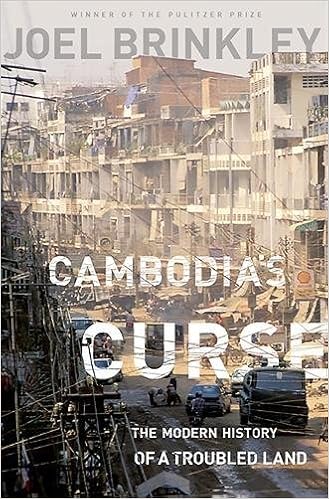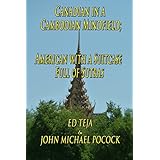Books written about Cambodia, especially modern Cambodia, are not, as a rule, cheerful reads. Most focus on the monumental, incredibly destructive force that was the Khmer Rouge. They look at the effect a relatively small number of people had on the lives of their countrymen and the way their rule twisted the country's history. Now, with HunSen resisting a popular movement that is tired of his long and heavy handed rule, people are watching closely. And they should be. My Cambodian friends are afraid of a powerful government that doesn't respect the people--and with good reason.
In this context, it is probably a good time to refresh our memories.
Cambodia's Curse: The Modern History of a Troubled Land
 In 2008 and 2009, Brinkley returned to Cambodia to find out. He discovered a population in the grip of a venal government. He learned that one-third to one-half of Cambodians who lived through the Khmer Rouge era have P.T.S.D.--and its afflictions are being passed to the next generation. His extensive close-up reporting in Cambodia's Curse illuminates the country, its people, and the deep historical roots of its modern-day behavior.
In 2008 and 2009, Brinkley returned to Cambodia to find out. He discovered a population in the grip of a venal government. He learned that one-third to one-half of Cambodians who lived through the Khmer Rouge era have P.T.S.D.--and its afflictions are being passed to the next generation. His extensive close-up reporting in Cambodia's Curse illuminates the country, its people, and the deep historical roots of its modern-day behavior. One of seven children of a high-ranking government official, Loung Ung lived a privileged life in the Cambodian capital of Phnom Penh until the age of five. Then, in April 1975, Pol Pot's Khmer Rouge army stormed into the city, forcing Ung's family to flee and, eventually, to disperse. Loung was trained as a child soldier in a work camp for orphans, her siblings were sent to labor camps, and those who survived the horrors would not be reunited until the Khmer Rouge was destroyed.
One of seven children of a high-ranking government official, Loung Ung lived a privileged life in the Cambodian capital of Phnom Penh until the age of five. Then, in April 1975, Pol Pot's Khmer Rouge army stormed into the city, forcing Ung's family to flee and, eventually, to disperse. Loung was trained as a child soldier in a work camp for orphans, her siblings were sent to labor camps, and those who survived the horrors would not be reunited until the Khmer Rouge was destroyed.
There are many other fine books that detail that period and its troubling effects, and I recommend you check around and read some. With all that is happening in the world, ignoring the changes going on in SE Asia, given its turbulent history, would be a mistake.
Canadian in a Cambodian Mindfield; American with a Suitcase Full of Sutras
And I'd be remiss if I didn't mention a lighter book on Cambodia. John Pocock initiated this project when I was living in Kampot, Cambodia. He came up with the idea of using my photographs and a series of mental images that we'd use poetically to capture impressions of the place and time. It seemed like fun.
This book was prepared in 2012 and isn't a serious discussion of anything. It is intended to play with ideas, poetic and visual images, that I encountered living there, and twisting them through two different perspectives.



